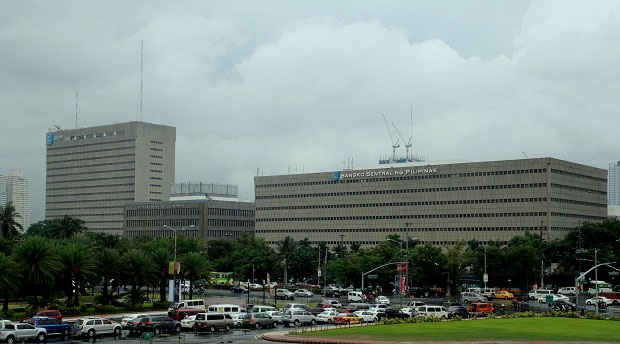
Bangko Sentral ng Pilipinas (BSP). RYAN LEAGOGO/INQUIRER.net FILE PHOTO
MANILA, Philippines — More dollars flowed out of the Philippine economy than entered it in May as the government repaid some of its maturing loans from overseas, reversing the net inflows recorded during the same period last year, according to the central bank.
In a statement, the Bangko Sentral ng Pilipinas (BSP) said the country’s overall balance of payments position posted a deficit of $1.4 billion in May 2021, marking a reversal from the $2.43-billion surplus recorded in May 2020.
“The balance of payments deficit in May was mainly attributed to outflows arising from the foreign currency withdrawals of the national government from its deposits with the BSP as [it] settled its foreign currency debt obligations and paid for various expenditures,” the central bank said.
These outflows were partly offset, however, by the inflows from the BSP’s foreign exchange operations and from the national government’s external borrowings that were deposited with the central bank.
The balance of payments is the net tally of all dollar transactions made by the country’s economy with the rest of the world. A surplus means the economy is earning more dollars than it is spending, but may also mean it is not spending enough for imported raw and intermediate materials needed for growth. A deficit, on the other hand, means the country is spending more than it is earning.
According to the central bank, the cumulative balance of payments position for the period January-May 2021 registered a deficit of $1.63 billion, a reversal of the $4.03-billion surplus recorded in the same period a year ago.
Based on preliminary data, this cumulative deficit was partly attributed to the wider merchandise trade deficit and net outflows of foreign portfolio investments.
The balance of payments position reflects a decrease in the final gross international reserves level to $107.25 billion as of end-May 2021 from $107.71 billion as of end-April 2021, and from $110.12 billion at the beginning of the year.
“The latest dollar reserve level represents a more than adequate external liquidity buffer equivalent to 12.2 months’ worth of imports of goods and payments of services and primary income,” the central bank said, adding that it is also about 7.9 times the country’s short-term external debt based on original maturity and 5.2 times based on residual maturity.
Last week the central bank predicted that dollar flows into the Philippines from overseas will post a bigger surplus this year than initially expected as exports start to recover, but tepid economic activity will continue to constrain imports.
Officials of the BSP have revised their latest estimated balance of payments surplus for 2021 to $7.1 billion or 1.8 percent of gross domestic product. This is higher than the full-year projection of $6.2 billion set by the Monetary Board last March but substantially lower than the record-high $16-billion BOP surplus for the whole of last year when the economic slump crimped imports and investments.

